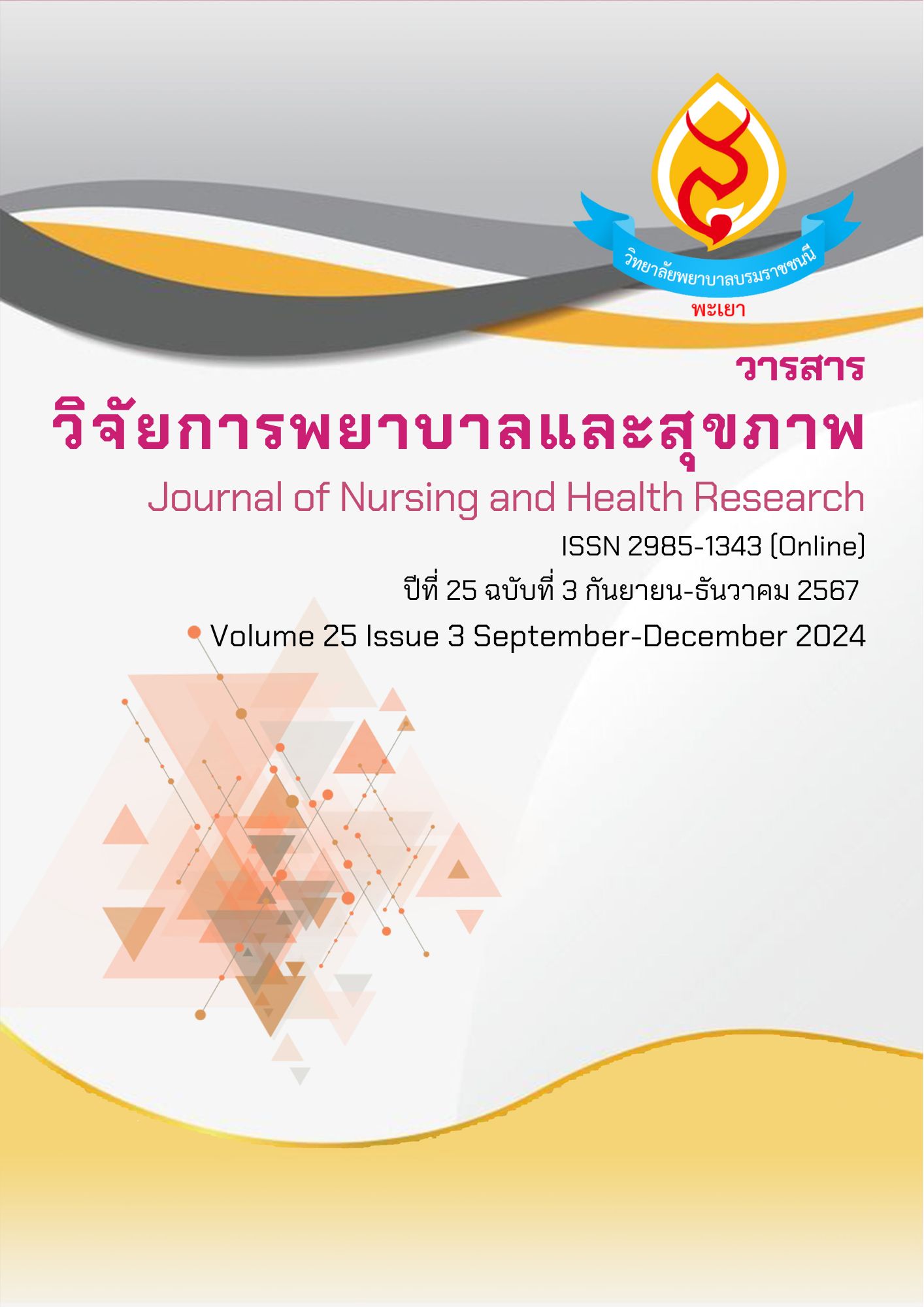ประสิทธิผลของการพัฒนาสมรรถนะนักวิจัยพันธุ์ใหม่เพื่อการผลิตและเผยแพร่ผลงานวิชาการโดยการวิเคราะห์อภิมานสู่การปฏิบัติโดยใช้หลักฐานเชิงประจักษ์
คำสำคัญ:
การทบทวนความรู้อย่างเป็นระบบ, การวิเคราะห์อภิมาน, สมรรถนะนักวิจัย, หลักฐานเชิงประจักษ์, การพัฒนาสมรรถนะด้านการวิจัยบทคัดย่อ
การพัฒนาบุคลากรที่มีศักยภาพสูงด้านการวิจัยมีความสำคัญต่อการขับเคลื่อนการผลิตผลงานวิชาการและยกระดับมาตรฐานของสถาบันการศึกษา การศึกษานี้เป็นการวิจัยกึ่งทดลองแบบกลุ่มเดียว วัดผลก่อน และหลังการทดลอง มีวัตถุประสงค์เพื่อศึกษาประสิทธิผลของโปรแกรมการพัฒนาสมรรถนะนักวิจัยพันธุ์ใหม่เพื่อการผลิตและเผยแพร่ผลงานวิชาการโดยการวิเคราะห์อภิมานสู่การปฏิบัติโดยใช้หลักฐานเชิงประจักษ์ กลุ่มตัวอย่างเป็นอาจารย์ในสังกัดสถาบันพระบรมราชชนก จำนวน 30 คน เครื่องมือที่ใช้ในการรวบรวมข้อมูลได้แก่ 1) ข้อมูลส่วนบุคคล
2) แบบทดสอบความรู้ 3) แบบประเมินสมรรถนะวิจัยด้านกระบวนการวิจัย ด้านการบริหารจัดการวิจัย และด้านคุณลักษณะ เจตคติ จรรยาบรรณนักวิจัย 4) แบบประเมินความพึงพอใจ ตรวจสอบคุณภาพโดยผู้ทรงคุณวุฒิ ได้ค่าความสอดคล้องระหว่างข้อคำถามกับวัตถุประสงค์ระหว่าง .67-1.00 และทดสอบความเชื่อมั่นแบบประเมินความรู้ได้ค่า KR-21 เท่ากับ .73 แบบสอบสมรรถนะวิจัยและความพึงพอใจได้ค่าสัมประสิทธิ์แอลฟ่าของครอนบาคเท่ากับ .99 และ .87 ตามลำดับ วิเคราะห์ข้อมูลด้วยสถิติเชิงพรรณนาและสถิติทดสอบทีคู่ ผลการวิจัย พบว่า หลังเข้าร่วมโปรแกรมกลุ่มตัวอย่างมีคะแนนเฉลี่ยความรู้การวิจัยวิเคราะห์ อภิมานเฉลี่ยสูงกว่าก่อนการเข้าอบรม อย่างมีนัยสำคัญทางสถิติ (t=9.433, p<.001) กลุ่มตัวอย่างมีคะแนนเฉลี่ยสมรรถนะวิจัยในภาพรวมสูงกว่าก่อนเข้าร่วมโปรแกรมอย่างมีนัยสำคัญทางสถิติ (t=4.826, p<.001) และมีคะแนนเฉลี่ยภาพรวมความพึงพอใจต่อการจัดโครงการพัฒนาสมรรถนะวิจัยอยู่ในระดับมากที่สุด (\bar{x}=4.83, SD=0.38) ผลการวิจัยพบว่า โปรแกรมนี้ช่วยเพิ่มขีดความสามารถของกลุ่มตัวอย่าง และควรนำไปประยุกต์ใช้ในการพัฒนาบุคลากรในสถาบันอื่นๆ เพื่อเพิ่มการผลิตผลงานวิชาการและผลงานวิจัยขั้นสูงต่อไป
เอกสารอ้างอิง
Aromataris, E., Lockwood, C., Porritt, K., Pilla, B., & Jordan, Z. (Eds.). (2024). JBI manual for evidence synthesis. JBI. https://doi.org/10.46658/JBIMES-24-01
Arcigal, R. J., & Briones, M. R. (2022). Research competency and satisfaction among the faculty members and administrators of laguna state polytechnic university: basis for research competency initiative program. Journal of Educational and Management Studies, 12(2), 39-43. https://dx.doi.org/10.54203/jems.2022.5
Bilal, Guraya, S. Y., & Chen, S. (2019). The impact and effectiveness of faculty development Program in fostering the faculty’s knowledge, skills, and professional competence: A systematic review and meta-analysis. Saudi Journal of Biological Sciences, 26(4), 688-697. https://pmc.ncbi.nlm.nih.gov/articles/PMC6486500/pdf/main.pdf
Basilio, M. B., & Bueno, D. C. (2019). Research skills and attitudes of master teachers in a division towards capability training. Online Submission. https://doi:10.17758/ERPUB3.UH0119421
Cochrane Methods. (2023). Cochrane Methods: Standards for Systematic Reviews. Cochrane. https://methods.cochrane.org
De-ong, W. (2020). NRCT develops the country with research and innovation. ScienceAsia, 48, 506-507. https://www.scienceasia.org/2022.48.n4/scias48_506.pdf
Higgins, J., Thomas, J., Chandler, J., Cumpston, M., Li, T., Page, M. J., & Welch, V. A. (2022). Cochrane Handbook for Systematic Reviews of Interventions (2nd ed.). Cochrane. https://training.cochrane.org/handbook
Jirakangwan, M., & Sarapon, S. (2013). Effects of the development competency research for registered nurses. Medical Journal of Srisaket Surin Burirum Hospital, 28(2), 121-129. https://he02.tci-thaijo.org/index.php/MJSSBH/article/view/128594 (In Thai)
Khammathit, A. (2021). The evidence-based approach in health care management applied to nursing, The Southern College Network Journal of Nursing and Public Health, 8(2): 315-328. https://he01.tci-thaijo.org/index.php/scnet/article/view/247693 (in Thai)
Khammathit, A., & Makrat, M. (2016). Using the systematic review to provide a complete summary on a research question in evidence-based practice: A 3-step method, The Southern College Network Journal of Nursing and Public Health, 3(3): 249-259. https://he01.tci-thaijo.org/index.php/scnet/article/view/68742 (in Thai)
Kwiek, M. (2018). International research collaboration and international research orientation: Comparative findings about European academics. Journal of Studies in International Education, 22(2), 136-160. http://dx.doi.org/10.1177/1028315317747084
Maneewong, A., Aeummaneekoon, N., klumpakorn, S.., & Kaewpan, W. (2016). Factors influencing research competency among public health nursing in central region, Thailand. Journal of Public Health Nursing, 30(3), 1–15. https://he01.tci-thaijo.org/index.php/phn/article/view/96505 (in Thai)
Melnyk, B. M., Gallagher-Ford, L., Long, L. E., & Fineout-Overholt, E. (2014). "The establishment of evidence-based practice competencies for practicing registered nurses and advanced practice nurses in real-world clinical settings: Proficiencies to improve healthcare quality, reliability, patient outcomes, and costs." Worldviews on Evidence-Based Nursing, 11(1), 5- 15. https://sigmapubs.onlinelibrary.wiley.com/doi/pdfdirect/10.1111/wvn.12021
OECD. (2021). OECD Science, Technology and Innovation Outlook 2021. OECD Publishing. https://doi.org/10.1787/sti_outlook
Page, M. J., McKenzie, J. E., Bossuyt, P. M., Boutron, I., Hoffmann, T. C., Mulrow, C. D., Shamseer, L., Tetzlaff, J. M., Akl, E. A., Brennan, S. E., Chou, R., Glanville, J., Grimshaw, J. M., Hróbjartsson, A., Lalu, M. M., Li, T., Loder, E. W., Mayo-Wilson, E., McDonald, S., McGuinness, L. A., ... Moher, D. (2021). The PRISMA 2020 statement: An updated guideline for reporting systematic reviews. BMJ, 372, n71. https://doi.org/10.1136/bmj.n71
Park, H. Y., & Kim, J. S. (2017). Factors influencing disaster nursing core competencies of emergency nurses. Applied Nursing Research, 37, 1-5. https://doi.org/10.1016/j.apnr.2017.06.004
Phongsiri, P., Meenongwah, J., Jareonukul, A., Kulpratepunya, K., Prasertsri, N., Kinkhae, S., Wansri, U., Wongtree, A., Boonsoo, T., Wattanakul, S., Boonsiriluck, S., Kijsomporn, J., & Inthongpan, O. (2021). a study of scoping reviews of health research of colleges under the praboromarachachanok institute. Journal of Health and Nursing Education, 27(1), 8 – 24. https://he02.tci-thaijo.org/index.php/TJONC/article/view/256539 (In Thai)
Phonphotthanamat, W. (2022). A comparative study of verifying the content validity of a research instrument with the IOC, CVR and CVI, Rungsit University Library Journal, 28(1): 169-192. https://rilj.rsu.ac.th/journal/57/article/281 (in Thai)
Praboromarajchanok Institute. (2024). Strategic Plan for Developing Praboromarajchanok Institiute 2023 – 2027. Praboromarajchanok Institute. https://drive.google.com/file/d/14NgSSbxuSn1cktufJi-68X0MECO3HsO1/view
Profetto-McGrath, J., & Raymond-Seniuk, C. (2021). Research utilization and critical thinking among newly graduated nurses – predictors for research use: a quantitative cross-sectional study. Evidence-Based Nursing. https://doi.org/10.1136/ebnurs-2011-100413
Punnue, I, Puttapitukpol, S & Boonyalepan, S. (2019). The research competencies of professional nurses in community hospital. Journal of Nursing and Health Care, 37(1), 80–87. https://he01.tci-thaijo.org/index.php/jnat-ned/article/view/181772 (in Thai)
Sanitlou, N., Sartphet, W. & Naphaarrak, Y. (2019). Sample size calculation using G*POWER program. Journal of Suvarnabhumi Institute of Technology (Humanities and Social Sciences), 5(1), 496-507. https://so04.tci-thaijo.org/index.php/svittj/article/view/181958 (in Thai)
Squires, J. E., Estabrooks, C. A., Gustavsson, P., & Wallin, L. (2021). Individual determinants of research utilization by nurses: An updated systematic review. Implementation science : IS, 6(1), 1-13. https://doi.org/10.1186/1748-5908-6-1
Suwanno, P., Lila, S., Jiraro, P. (2017). development of research competency evaluation model for lecturers of Southern Rajabhat University. Journal of Education and Social Development, 13(1), 79-94. https://ojs.lib.buu.ac.th/index.php/social/article/view/5091 (in Thai)
The Joanna Briggs Institute. (2013). New JBI levels of evidence. https://jbi.global/sites/default/files/2019-05/JBI-Levels-of-evidence_2014_0.pdf
Velandia Mesa, C., Serrano Pastor, F. J., & Martínez Segura, M. J. (2019). The challenge of competencies in training for educational research: a conceptual approach. Actualidades Investigativas en Educación, 19(3), 310-339. https://www.scielo.sa.cr/pdf/aie/v19n3/1409-4703-aie-19-03-310.pdf
ดาวน์โหลด
เผยแพร่แล้ว
รูปแบบการอ้างอิง
ฉบับ
ประเภทบทความ
สัญญาอนุญาต
ลิขสิทธิ์ (c) 2024 วารสารวิจัยการพยาบาลและสุขภาพ

อนุญาตภายใต้เงื่อนไข Creative Commons Attribution-NonCommercial-NoDerivatives 4.0 International License.



